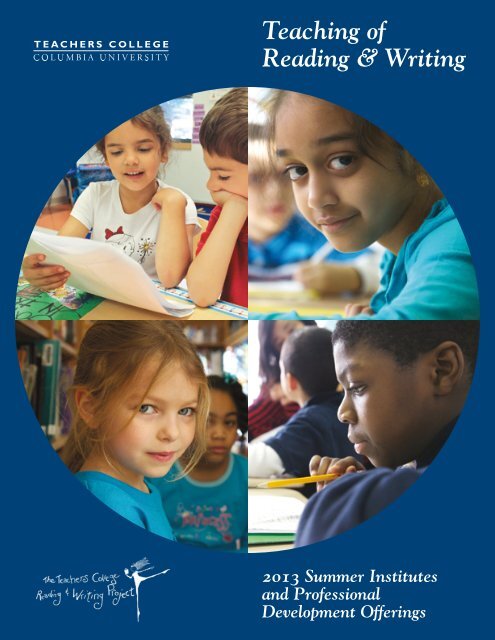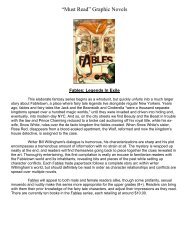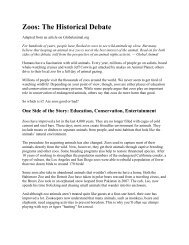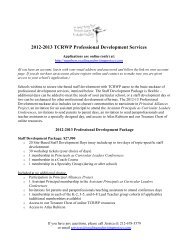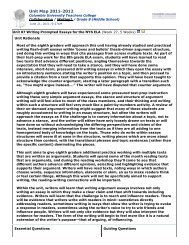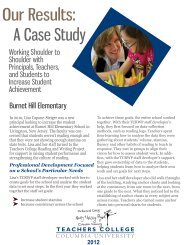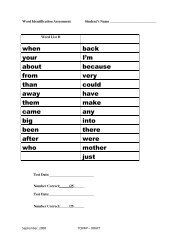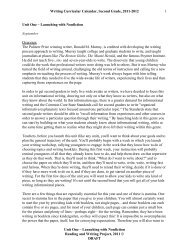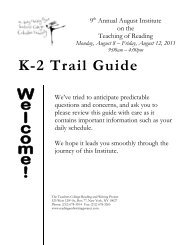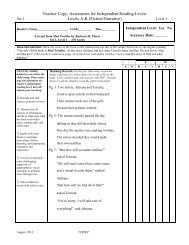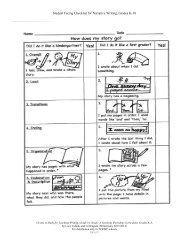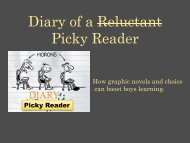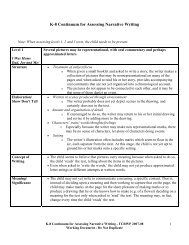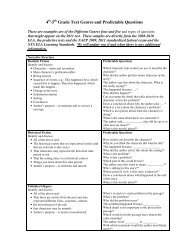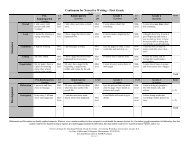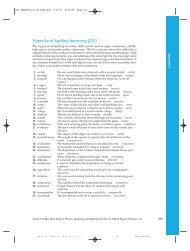Download the 2013 brochure! - The Reading & Writing Project
Download the 2013 brochure! - The Reading & Writing Project
Download the 2013 brochure! - The Reading & Writing Project
Create successful ePaper yourself
Turn your PDF publications into a flip-book with our unique Google optimized e-Paper software.
Teaching of<br />
<strong>Reading</strong> & <strong>Writing</strong><br />
<strong>2013</strong> Summer Institutes<br />
and Professional<br />
Development Offerings
Dear Friends:<br />
For thirty-one years, educators have come toge<strong>the</strong>r at Teachers<br />
College for summer institutes on <strong>the</strong> teaching of reading and writing.<br />
Toge<strong>the</strong>r we study methods and plan curricula, revitalize our thinking,<br />
and learn ways to help students to lead richly literate lives. During <strong>the</strong><br />
school year, many institute participants continue to study with staff<br />
developers in <strong>the</strong>ir schools and return to TC for conferences led by<br />
<strong>Reading</strong> and <strong>Writing</strong> <strong>Project</strong> leaders. This summer’s speakers include:<br />
David Adler, author of <strong>the</strong> Cam Jansen mystery series and <strong>The</strong><br />
Picture Biography Series<br />
Carl Anderson, author of Assessing Writers and How’s It Going?<br />
Kylene Beers, author of When Kids Can’t Read–What Teachers Can<br />
Do and former president of NCTE<br />
Ka<strong>the</strong>rine Bomer, author of Starting with What Students Do Best<br />
and Hidden Gems<br />
Lucy Calkins, Founding Director of <strong>the</strong> TCRWP and author/<br />
co-author of 40+ books, including most recently <strong>the</strong> Units of Study<br />
in Opinion, Information, and Narrative <strong>Writing</strong><br />
Billy Collins, United States Poet Laureate and author of Horoscopes<br />
for <strong>the</strong> Dead<br />
Kathy Collins, author of Growing Readers and <strong>Reading</strong> for Real<br />
Christopher Paul Curtis, award-winning author of Bud, Not Buddy<br />
and <strong>The</strong> Mighty Miss Malone<br />
Mary Ehrenworth, Deputy Director for Middle Schools and co-author<br />
of Units of Study in Opinion, Information, and Narrative <strong>Writing</strong> and<br />
of <strong>The</strong> Power of Grammar<br />
Ralph Fletcher, author of Fig Pudding and professional literature<br />
such as Teaching <strong>the</strong> Qualities of <strong>Writing</strong><br />
Stephanie Harvey, co-author of Comprehension and Collaboration:<br />
Inquiry Circles in Action<br />
Lester Laminack, author of many books for children including <strong>The</strong><br />
Sunsets of Miss Olivia Wiggins and Trevor’s Wiggly-Wobbly Tooth<br />
Patricia MacLachlan, award-winning author of Sarah, Plain and Tall<br />
and Edward’s Eyes<br />
Timothy Rasinski, author of <strong>The</strong> Fluent Reader and Rebuilding <strong>the</strong><br />
Foundation<br />
Pam Muñoz Ryan, author of award-winning Esperanza Rising,<br />
as well as Riding Freedom and <strong>The</strong> Dreamer<br />
Kathleen Tolan, Senior Deputy Director of <strong>the</strong> TCRWP and<br />
co-author of Units of Study in Opinion, Information, and Narrative<br />
<strong>Writing</strong> and of Units of Study for Teaching <strong>Reading</strong><br />
Tony Wagner, author of <strong>the</strong> critically important book, <strong>The</strong> Global<br />
Achievement Gap<br />
Sarah Weeks, award-winning author of So B. It., Mac and Cheese<br />
and Pie<br />
I strongly encourage you to submit your applications online as soon<br />
as possible. Please check that your application is complete and that<br />
you select second choices when requested. If you run into trouble,<br />
please call 1-888-RWP-SUMI (1-888-797-7864).<br />
Best,<br />
Lucy Calkins, Founding Director
CONTENTS<br />
2| <strong>The</strong> 31st Annual June Institute on <strong>the</strong><br />
Teaching of <strong>Writing</strong> (June 24 – 28, <strong>2013</strong>)<br />
Speakers • Schedule • Advanced Sessions<br />
4| <strong>The</strong> 20th Annual July Institute on <strong>the</strong> Teaching<br />
of <strong>Reading</strong> (July 1 – 6, <strong>2013</strong>) Institute Closed Thursday, July 4<br />
Speakers • Schedule • Advanced Sessions<br />
6| <strong>The</strong> 20th Annual August Institute on <strong>the</strong><br />
Teaching of <strong>Writing</strong> (August 5 – 9, <strong>2013</strong>)<br />
Speakers • Schedule • Advanced Sessions<br />
8| <strong>The</strong> 11th Annual August Institute on <strong>the</strong><br />
Teaching of <strong>Reading</strong> (August 12 – 16, <strong>2013</strong>)<br />
Speakers • Schedule • Advanced Sessions<br />
10| Application Procedures<br />
Important Dates • Application Information • Noncredit Fees<br />
Payment Methods and Deadlines • Graduate Credit Fees<br />
APPLICATIONS WILL BE AVAILABLE ONLINE ONLY<br />
(tc.readingandwritingproject.com) beginning February 14, <strong>2013</strong><br />
12| Professional Development Offerings<br />
Saturday Reunions • Common Core Conference Days<br />
15| Frequently Asked Questions<br />
Acceptance Guidelines • Withdrawal and Refunds<br />
Services for Disabilities • Housing Information<br />
<strong>The</strong> most up-to-date information on <strong>the</strong><br />
Teachers College <strong>Reading</strong> and <strong>Writing</strong> <strong>Project</strong><br />
is on our website: tc.readingandwritingproject.com.
<strong>The</strong> 31st Annual June Institute on <strong>the</strong><br />
Teaching of <strong>Writing</strong><br />
Monday, June 24 – Friday, June 28, <strong>2013</strong><br />
8:30 a.m. – 3:30 p.m.<br />
HIGHLIGHTS OF<br />
THE INSTITUTE<br />
This institute is designed for<br />
educators, classroom teachers,<br />
school administrators, and curriculum<br />
specialists who are committed to<br />
turning classrooms into richly literate<br />
reading and writing workshops. <strong>The</strong><br />
following is a partial list of topics that<br />
will be studied:<br />
• Common Core-aligned curriculum in<br />
<strong>the</strong> teaching of writing<br />
• Creating ambitious goals that<br />
encourage independence, volume,<br />
qualities of good writing and craft<br />
• Genre studies in writing essays,<br />
narratives, and informational texts<br />
• Methods of holding students<br />
accountable for doing <strong>the</strong>ir<br />
best work<br />
• Teaching reading in <strong>the</strong> writing<br />
workshop<br />
• Classroom structures that support<br />
inquiry and collaboration<br />
• Using performance assessments and<br />
learning progressions to develop<br />
data-based instruction in writing<br />
• Using toolkits, charts, and studentfacing<br />
rubrics to support revision<br />
• Teaching students to research<br />
towards source-based information<br />
and argument writing<br />
• Using technology to enhance<br />
<strong>the</strong> research and writing<br />
process<br />
SPEAKERS<br />
Carl Anderson is <strong>the</strong> author of Assessing Writers and How’s It Going? A Practical<br />
Guide to Conferring with Student Writers. His latest project is a book series: Strategic<br />
<strong>Writing</strong> Conferences: Smart Conversations That Move Young Writers Forward.<br />
Billy Collins, renowned United States Poet Laureate 2001-2003, has published<br />
eight collections of poetry, including Questions About Angels, Picnic, Lightning, and<br />
most recently Horoscopes for <strong>the</strong> Dead. His poems have appeared in a variety of<br />
periodicals including <strong>The</strong> New Yorker, <strong>The</strong> Paris Review, and <strong>The</strong> American Scholar, and<br />
is a Guggenheim fellow and a New York Public Library “Literary Lion.”<br />
Lucy Calkins, Founding Director of <strong>the</strong> TCRWP, is <strong>the</strong> author or co-author of<br />
40+ books including <strong>the</strong> newly released Units of Study in Opinion, Information, and<br />
Narrative <strong>Writing</strong> written with <strong>the</strong> TCRWP community, and Pathways to <strong>the</strong> Common<br />
Core. Her foundational texts include <strong>The</strong> Art of Teaching <strong>Reading</strong>, <strong>The</strong> Art of Teaching<br />
<strong>Writing</strong>, and Units of Study for Teaching <strong>Reading</strong>, Grades 3-5. Calkins is <strong>the</strong> Robinson<br />
Professor of Children’s Literature at Teachers College, Columbia University where<br />
she co-directs <strong>the</strong> Literacy Specialist Program.<br />
Mary Ehrenworth, Deputy Director for Middle Schools at <strong>the</strong> TCRWP, is <strong>the</strong><br />
co-author of Pathways to <strong>the</strong> Common Core; <strong>The</strong> Power of Grammar; and titles in Units<br />
of Study for Teaching <strong>Reading</strong>, Grades 3-5. She is co-author of From Scenes to Series:<br />
<strong>Writing</strong> Fiction, Grade 1, and <strong>The</strong> Research-Based Argument Essay, Grade 5, in Units<br />
of Study in Opinion, Information, and Narrative <strong>Writing</strong>.<br />
Amanda Hartman, Associate Director of <strong>the</strong> TCRWP, has co-authored Oneto-One:<br />
<strong>The</strong> Art of Conferring with Young Writers, as well as Launching <strong>the</strong> <strong>Writing</strong><br />
Workshop, Kindergarten, and Lessons from <strong>the</strong> Masters: Improving Narrative Craft,<br />
Grade 2, in Units of Study in Opinion, Information, and Narrative <strong>Writing</strong>.<br />
Patricia MacLachlan is <strong>the</strong> Newbery Award winning author of Sarah, Plain and<br />
Tall, which also received <strong>the</strong> School Library Journal’s Best Books of <strong>the</strong> Year and <strong>The</strong><br />
New York Times Notable Children’s Books of <strong>the</strong> Year designation. Her more than 20<br />
acclaimed picture books and novels for children include Who Loves Me?, Arthur, for <strong>the</strong><br />
Very First Time, Edward’s Eyes, and Your Moon, My Moon. She also teaches a course on<br />
children’s literature at Smith College.<br />
Tony Wagner is <strong>the</strong> author of <strong>the</strong> critically important book, <strong>The</strong> Global Achievement<br />
Gap: Why Even Our Best Schools Don’t Teach <strong>the</strong> New Survival Skills Our Children Need—<br />
and What We Can Do About It. His o<strong>the</strong>r titles include: Change Leadership: A Practical<br />
Guide to Transforming Our Schools, Making <strong>the</strong> Grade: Reinventing America’s Schools,<br />
and <strong>the</strong> recently released Creating Innovators: <strong>The</strong> Making of Young People Who Will<br />
Change <strong>the</strong> World.<br />
Sarah Weeks is an award-winning author of more than fifty picture books and<br />
novels including <strong>the</strong> bestselling novel, So B. It. Two of her most recent contributions<br />
are Mac and Cheese and Pie. Sarah is an adjunct faculty member at <strong>the</strong> New School<br />
and a founding member of ART, a traveling troupe of authors who perform reader’s<br />
<strong>the</strong>atre across <strong>the</strong> country.<br />
2 | <strong>Project</strong> Events <strong>2013</strong>
JUNE WRITING INSTITUTE SCHEDULE<br />
First Year<br />
Participants<br />
First year participants spend half of <strong>the</strong> day in one of five large group sections. <strong>The</strong> large group sections<br />
support specific grade levels: Kindergarten, 1st grade, 2nd grade, 3rd – 5th grades, and 6th – 8th grades.<br />
For <strong>the</strong> o<strong>the</strong>r half of <strong>the</strong> day, participants work in small, interactive sections to develop <strong>the</strong> skills necessary<br />
to teach writing well (organized by grade level/background with <strong>the</strong> project).<br />
First Year<br />
Administrators and<br />
Staff Developers<br />
In order to create schools in which young people thrive as readers and writers, it is crucial that<br />
administrators as well as teachers receive support in <strong>the</strong> complex and critical task of curricular<br />
leadership. This institute will include sections for principals, as well as workshops and discussion<br />
groups to support assistant principals, coaches, and staff developers.<br />
Advanced Participants<br />
(returning)<br />
Advanced participants who are returning should select morning and afternoon sessions<br />
from <strong>the</strong> advanced sections (below).<br />
Advanced Administrators<br />
(returning)<br />
Advanced administrators who are returning should select morning and afternoon<br />
sessions from <strong>the</strong> advanced sections (below) and may schedule times to meet with<br />
a <strong>Project</strong> leader to discuss <strong>the</strong>ir schools.<br />
ADVANCED SESSIONS<br />
Morning Sessions<br />
A. Literature Can Spur Revision (K-2). Carl Anderson<br />
B. Using Checklists, Exemplars and Performance Assessments to Rev Up Student Goal-Driven<br />
Work (K-2). Christine Holley<br />
C. Widening Our Repertoire of Teaching Methods for Whole and Small Groups So Teaching Is as<br />
Engaging and as Active as It Can Be (K-2). Monique Knight<br />
D. Develop a Wide Repertoire of Teaching Strategies for Motivating and Enabling Struggling and<br />
Resistant Writers (3-8). Colleen Cruz<br />
E. Lift <strong>the</strong> Level of Talking and <strong>Writing</strong> About Literature: Bring Students to Common Core<br />
Levels of Comprehension (3-8). Mary Ehrenworth<br />
F. Master <strong>The</strong> Story Arc and Find Your Voice by <strong>Writing</strong> Under <strong>The</strong> Tutelage of A Renowned<br />
Children’s Author: A <strong>Writing</strong> Workshop with Author Sarah Weeks (3-8).<br />
G. <strong>Writing</strong> About <strong>Reading</strong>: From Notes to Entries to Essays (4-8). Kelly Boland Hohne<br />
Afternoon Sessions<br />
H. Words Glorious Words: A Close Look at Vocabulary, Spelling and Phonics in <strong>the</strong> <strong>Writing</strong> Workshop (K-2). Rachel Rothman<br />
I. <strong>The</strong> Art of <strong>Writing</strong> a Picture Book Through Exploration of Structure, Language, Message and Style: A <strong>Writing</strong> Workshop with<br />
Author Sarah Weeks (K-2).<br />
J. <strong>Writing</strong> About Science: Lab Reports and Information <strong>Writing</strong> (and Developing Curriculum) (1-2). Lauren Kolbeck<br />
K. <strong>Reading</strong>-<strong>Writing</strong> Connections Can Spur Revision (3-8). Carl Anderson<br />
L. Research -Based Information <strong>Writing</strong>: Explore a New Territory and Learn Underlying Principles of Curriculum<br />
Development in <strong>Writing</strong> (3-8). Lucy Calkins & Kelly Boland Hohne<br />
M. Tap <strong>the</strong> Power of Self-Assessment, Critical Feedback and <strong>Writing</strong> Goals to Spur Revision and<br />
Growth (3-8). Alexandra Marron<br />
N. <strong>The</strong> Craft of Opinion/Argument <strong>Writing</strong> (4-8). Kate Roberts<br />
<strong>Project</strong> Events <strong>2013</strong> | 3
<strong>The</strong> 20th Annual July Institute on <strong>the</strong><br />
Teaching of reading<br />
Monday, July 1 – Saturday, July 6, <strong>2013</strong><br />
8:30 a.m. – 3:30 p.m.<br />
HIGHLIGHTS OF<br />
THE INSTITUTE<br />
This institute is designed for<br />
educators, classroom teachers,<br />
school administrators, and<br />
curriculum specialists who are<br />
committed to turning classrooms<br />
into richly literate reading and<br />
writing workshops. <strong>The</strong> following<br />
is a partial list of topics that will be<br />
studied:<br />
•<strong>The</strong> central role of curriculum<br />
development in <strong>the</strong> teaching<br />
of reading<br />
• Units of study in <strong>the</strong> reading<br />
workshop<br />
• Aligning reading instruction to <strong>the</strong><br />
Common Core State Standards<br />
• Comprehension strategy instruction<br />
• Phonics as an integral component<br />
of early literacy<br />
• Methods of holding students<br />
accountable for doing <strong>the</strong>ir<br />
best work<br />
• Teaching interpretation, syn<strong>the</strong>sis<br />
and critical reading<br />
• Formative assessments and using<br />
learning progressions to plan for<br />
instructional next steps<br />
• Classroom structures that support<br />
inquiry and collaboration<br />
• Supporting cross-textual work<br />
in nonfiction<br />
• <strong>Reading</strong> across <strong>the</strong><br />
curriculum<br />
• <strong>Writing</strong> about<br />
reading<br />
SPEAKERS<br />
David Adler is <strong>the</strong> author of <strong>the</strong> Cam Jansen mystery series and of more than 200<br />
o<strong>the</strong>r books for children. <strong>The</strong>se include many information books on math, science,<br />
and social studies such as We Remember <strong>the</strong> Holocaust, <strong>The</strong> Picture Biography Series, and<br />
most recently, Don’t Talk to Me About <strong>the</strong> War.<br />
Kylene Beers is author of When Kids Can’t Read–What Teachers Can Do,<br />
and co-author of Adolescent Literacy: Turning Promise Into Practice and Notice and<br />
Note: Strategies for Close <strong>Reading</strong>. She served as President of <strong>the</strong> National Council<br />
of Teachers of English and received <strong>the</strong> 2011 Conference on English Leadership<br />
outstanding leader award.<br />
Lucy Calkins, Founding Director of <strong>the</strong> TCRWP, is <strong>the</strong> author or co-author of<br />
40+ books including <strong>the</strong> newly released Units of Study in Opinion, Information, and<br />
Narrative <strong>Writing</strong> written with <strong>the</strong> TCRWP community, and Pathways to <strong>the</strong> Common<br />
Core. Her foundational texts include <strong>The</strong> Art of Teaching <strong>Reading</strong>, <strong>The</strong> Art of Teaching<br />
<strong>Writing</strong>, and Units of Study for Teaching <strong>Reading</strong>, Grades 3-5. Calkins is <strong>the</strong> Robinson<br />
Professor of Children’s Literature at Teachers College, Columbia University where she<br />
co-directs <strong>the</strong> Literacy Specialist Program.<br />
Kathy Collins, a former TCRWP staff member and beloved keynote speaker, is<br />
<strong>the</strong> author of Growing Readers: Units of Study in <strong>the</strong> Primary Classroom and <strong>Reading</strong> for<br />
Real: Teach Students to Read with Power, Intention and Joy in K-3 Classrooms. Kathy has<br />
been a first-grade teacher in Brooklyn, NY and an adjunct instructor at <strong>the</strong> University<br />
of Alaska.<br />
Christopher Paul Curtis is <strong>the</strong> award-winning author of Bud, Not Buddy, <strong>the</strong><br />
first book ever to receive both <strong>the</strong> Newbery Medal and <strong>the</strong> Coretta Scott King Award.<br />
His book, Elijah of Buxton is <strong>the</strong> winner of <strong>the</strong> Scott O’Dell Historical Fiction Award,<br />
<strong>the</strong> Coretta Scott King Award and a Newbery Honor. He has also written many o<strong>the</strong>r<br />
beloved books such as <strong>The</strong> Watsons Go to Birmingham:1963, and most recently, <strong>The</strong><br />
Mighty Miss Malone.<br />
Mary Ehrenworth, Deputy Director for Middle Schools at <strong>the</strong> TCRWP, is <strong>the</strong><br />
coauthor of Pathways to <strong>the</strong> Common Core; <strong>The</strong> Power of Grammar; and titles in Units<br />
of Study for Teaching <strong>Reading</strong>, Grades 3-5. She is co-author of From Scenes to Series:<br />
<strong>Writing</strong> Fiction, Grade 1, and <strong>The</strong> Research-Based Argument Essay, Grade 5, in Units<br />
of Study in Opinion, Information, and Narrative <strong>Writing</strong>.<br />
Amanda Hartman, Associate Director of <strong>the</strong> TCRWP, has co-authored Oneto-One:<br />
<strong>The</strong> Art of Conferring with Young Writers, as well as Launching <strong>the</strong> <strong>Writing</strong><br />
Workshop, Kindergarten, and Lessons from <strong>the</strong> Masters: Improving Narrative Craft,<br />
Grade 2, in Units of Study in Opinion, Information, and Narrative <strong>Writing</strong>.<br />
Kathleen Tolan, Senior Deputy Director of <strong>the</strong> TCRWP, is co-author of Building<br />
a <strong>Reading</strong> Life, Following Characters into Meaning, and Navigating Nonfiction in Units of<br />
Study for Teaching <strong>Reading</strong>, Grades 3-5. She is coauthor of <strong>The</strong> Literary Essay: <strong>Writing</strong><br />
About Fiction, Grade 4, in Units of Study in Opinion, Information, and Narrative <strong>Writing</strong>.<br />
4 | <strong>Project</strong> Events <strong>2013</strong>
JULY READING INSTITUTE SCHEDULE<br />
First Year<br />
Participants<br />
First year participants spend half of <strong>the</strong> day in one of five large group sections. <strong>The</strong> large group sections<br />
support specific grade levels: Kindergarten, 1st grade, 2nd grade, 3rd – 5th grades, and 6th – 8th grades.<br />
For <strong>the</strong> o<strong>the</strong>r half of <strong>the</strong> day, participants work in small, interactive sections to develop <strong>the</strong> skills necessary<br />
to teach reading well (organized by grade level/background with <strong>the</strong> <strong>Project</strong>).<br />
First Year<br />
Administrators and<br />
Staff Developers<br />
In order to create schools in which young people thrive as readers and writers, it is crucial that<br />
administrators as well as teachers receive support in <strong>the</strong> complex and critical task of curricular<br />
leadership. This institute will include sections for principals, as well as workshops and discussion<br />
groups to support assistant principals, coaches, and staff developers.<br />
Advanced Participants<br />
(returning)<br />
Advanced participants who are returning should select morning and afternoon sessions<br />
from <strong>the</strong> advanced sections (below).<br />
Advanced Administrators<br />
(returning)<br />
Advanced administrators who are returning should select morning and afternoon sessions<br />
from <strong>the</strong> advanced sections (below) and may schedule times to meet with a <strong>Project</strong><br />
leader to discuss <strong>the</strong>ir schools.<br />
ADVANCED SESSIONS<br />
Morning Sessions<br />
A. Make Your Word Study Work Memorable and Transferable (K-1). Christine Cook Robson<br />
B. <strong>Writing</strong> About <strong>Reading</strong>: Using <strong>Writing</strong> and Talking About <strong>Reading</strong> to Lift <strong>the</strong> Level of<br />
Comprehension (K-2). Kathy Collins<br />
C. Bring More <strong>Writing</strong> and <strong>Reading</strong> Into Your Science Work in Ways that Accelerate <strong>Reading</strong><br />
Development (K-2). Amanda Hartman<br />
D. Teach Kids to Transfer Between Narrative <strong>Reading</strong> and <strong>Writing</strong>: <strong>The</strong> Reciprocity of Skills Can<br />
Move Learners Forward (3-5).<br />
Shana Frazin<br />
E. Teachers of Upper Grade Strugglers Need to Know, Transfer and Adapt Methods Primary<br />
Teachers Use to Build Strong <strong>Reading</strong> Foundations (3-5). Natalie Louis<br />
F. Making and Using Power Tools: <strong>The</strong> Demonstration Texts, Scaffolds and Conferring Tool Kits<br />
that Make Comprehension Concrete (3-8). Kate Roberts<br />
G. <strong>Reading</strong>-<strong>Writing</strong> Connections in a Common Core World: Readers Work with <strong>the</strong> Relationship<br />
Between Craft and Central Ideas (4-8). Mary Ehrenworth<br />
Afternoon Sessions<br />
H. Invent Tools and Methods that Help Readers Move up <strong>the</strong> Ladder of Text Complexity (K-2). Natalie Louis<br />
I. Create a Toolkit of Resources to Support Small Group Work and Conferences (K-2). Shanna Schwartz<br />
J. Guided <strong>Reading</strong> and Strategy Lessons: Teaching with Traction (1-2). Enid Martinez<br />
K. Develop <strong>the</strong> Skills Necessary to Lead Effective Small Groups: Strategy Lessons, Guided <strong>Reading</strong> and More<br />
(3-5). Brooke Geller<br />
L. Powering Our Social Studies Curriculum to Support Higher Level Comprehension (3-6).<br />
Kathleen Tolan<br />
M. <strong>The</strong> Intersection of Close <strong>Reading</strong> and Nonfiction Strategy Instruction (3-8). Kate Roberts<br />
N. Nonfiction Text Sets Teach Author’s Intent, Point of View, Syn<strong>the</strong>sis and Critical <strong>Reading</strong><br />
(4-8). Maggie Beattie Roberts<br />
<strong>Project</strong> Events <strong>2013</strong> | 5
<strong>The</strong> 20th Annual August Institute on <strong>the</strong><br />
Teaching of writing<br />
Monday, August 5 – Friday, August 9, <strong>2013</strong><br />
8:30 a.m. – 3:30 p.m.<br />
HIGHLIGHTS OF<br />
THE INSTITUTE<br />
This institute is designed for<br />
educators, classroom teachers,<br />
school administrators, and curriculum<br />
specialists who are committed to<br />
turning classrooms into richly literate<br />
reading and writing workshops. <strong>The</strong><br />
following is a partial list of topics that<br />
will be studied:<br />
• Common Core-aligned curriculum in<br />
<strong>the</strong> teaching of writing<br />
• Creating ambitious goals that<br />
encourage independence, volume,<br />
qualities of good writing and craft<br />
• Genre studies in writing essays,<br />
narratives, and informational texts<br />
• Methods of holding students<br />
accountable for doing <strong>the</strong>ir<br />
best work<br />
• Teaching reading in <strong>the</strong> writing<br />
workshop<br />
• Classroom structures that support<br />
inquiry and collaboration<br />
• Using performance assessments and<br />
learning progressions to develop<br />
data-based instruction in writing<br />
• Using toolkits, charts, and studentfacing<br />
rubrics to support revision<br />
• Teaching students to research<br />
towards source-based information<br />
and argument writing<br />
• Using technology to enhance <strong>the</strong><br />
research and writing process<br />
SPEAKERS<br />
Carl Anderson is <strong>the</strong> author of Assessing Writers and How’s It Going? A Practical<br />
Guide to Conferring with Student Writers. His latest project is a book series: Strategic<br />
<strong>Writing</strong> Conferences: Smart Conversations That Move Young Writers Forward.<br />
Lucy Calkins, Founding Director of <strong>the</strong> TCRWP, is <strong>the</strong> author or co-author of<br />
40+ books including <strong>the</strong> newly released Units of Study in Opinion, Information, and<br />
Narrative <strong>Writing</strong> written with <strong>the</strong> TCRWP community, and Pathways to <strong>the</strong> Common<br />
Core. Her foundational texts include <strong>The</strong> Art of Teaching <strong>Reading</strong>, <strong>The</strong> Art of Teaching<br />
<strong>Writing</strong>, and Units of Study for Teaching <strong>Reading</strong>, Grades 3-5. Calkins is <strong>the</strong> Robinson<br />
Professor of Children’s Literature at Teachers College, Columbia University where she<br />
co-directs <strong>the</strong> Literacy Specialist Program.<br />
Colleen Cruz, senior lead staff developer at <strong>the</strong> TCRWP, is <strong>the</strong> author of Independent<br />
<strong>Writing</strong>—One Teacher, Thirty-Two Needs, Topics and Plans and co-author of <strong>The</strong> Art of<br />
Informational <strong>Writing</strong>, Grade 3, and <strong>The</strong> Arc of Story: <strong>Writing</strong> Realistic Fiction, Grade 4,<br />
in Units of Study in Opinion, Information, and Narrative <strong>Writing</strong>.<br />
Ralph Fletcher, is <strong>the</strong> author of over a score of books, including professional<br />
literature such as Teaching <strong>the</strong> Qualities of <strong>Writing</strong> and Mentor Author, Mentor Texts. He<br />
has written books for children including Fig Pudding, Hello, Harvest Moon, Guy-Write<br />
and anthologies of poetry.<br />
Amanda Hartman, Associate Director of <strong>the</strong> TCRWP, has co-authored<br />
One-to-One: <strong>The</strong> Art of Conferring with Young Writers, as well as Launching <strong>the</strong><br />
<strong>Writing</strong> Workshop, Kindergarten, and Lessons from <strong>the</strong> Masters: Improving Narrative<br />
Craft, Grade 2, in Units of Study in Opinion, Information, and Narrative <strong>Writing</strong>.<br />
Chris Lehman, a lead staff developer for <strong>the</strong> TCRWP, is co-author with<br />
Lucy Calkins and Mary Ehrenworth of Pathways to <strong>the</strong> Common Core: Accelerating<br />
Achievement. He is also <strong>the</strong> author of A Quick Guide to Reviving Disengaged Writers, 5-8<br />
and of <strong>the</strong> recently released Energize Research <strong>Reading</strong> and <strong>Writing</strong>.<br />
Pam Muñoz Ryan, has written over thirty books for young people including <strong>the</strong><br />
award-winning Esperanza Rising, as well as Riding Freedom, Paint <strong>the</strong> Wind, and <strong>The</strong><br />
Dreamer. She is <strong>the</strong> recipient of <strong>the</strong> Civil and Human Rights Award from <strong>the</strong> NEA,<br />
of <strong>the</strong> Virginia Hamilton Award for Multicultural Literature, and of <strong>the</strong> Willa Ca<strong>the</strong>r<br />
Literacy Award for writing.<br />
6 | <strong>Project</strong> Events <strong>2013</strong>
AUGUST WRITING INSTITUTE SCHEDULE<br />
First Year<br />
Participants<br />
First year participants spend half of <strong>the</strong> day in one of five large group sections. <strong>The</strong> large group sections<br />
support specific grade levels: Kindergarten, 1st grade, 2nd grade, 3rd – 5th grades, and 6th – 8th grades.<br />
For <strong>the</strong> o<strong>the</strong>r half of <strong>the</strong> day, participants work in small, interactive sections to develop <strong>the</strong> skills necessary<br />
to teach writing well (organized by grade level/background with <strong>the</strong> <strong>Project</strong>).<br />
First Year<br />
School Leaders<br />
In order to create schools in which young people thrive as readers and writers, it is crucial that<br />
school leaders such as principals, assistant principals, coaches and staff developers receive<br />
support in <strong>the</strong> complex and critical task of curricular leadership. This institute will include<br />
sections, as well as workshops and discussion groups, to support school leaders.<br />
advanced participants<br />
(returning)<br />
Advanced participants who are returning should select morning and afternoon sessions<br />
from <strong>the</strong> advanced sections (below).<br />
Advanced School<br />
Leaders (returning)<br />
Advanced school leaders who are returning should select morning and afternoon sessions<br />
from <strong>the</strong> advanced sections (below) and may schedule times to meet with a <strong>Project</strong> leader<br />
to discuss <strong>the</strong>ir schools.<br />
ADVANCED SESSIONS<br />
Morning Sessions<br />
A. Literature Can Spur Revision (K-2). Carl Anderson<br />
B. Opinion <strong>Writing</strong> in <strong>the</strong> <strong>Writing</strong> Workshop and Across <strong>the</strong> Curriculum: Petitions, Persuasive<br />
Letters, Debates and More (K-2). Elizabeth Dunford<br />
C. Using Checklists, Exemplars and Performance Assessments to Rev Up Student<br />
Goal-Driven Work (K-2). Christine Holley<br />
D. Lift <strong>the</strong> Level of Talking and <strong>Writing</strong> About Literature: Bring Students to Common Core<br />
Levels of Comprehension (3-8). Chris Lehman<br />
E. Staff Development in <strong>Writing</strong>: Methods that Maximize Growth (3-8). Jerry Maraia<br />
F. Tap <strong>the</strong> Power of Self-Assessment, Critical Feedback and <strong>Writing</strong> Goals to Spur Revision<br />
and Growth (3-8). Alexandra Marron<br />
G. Develop a Wide Repertoire of Teaching Strategies for Motivating and Enabling Struggling<br />
and Resistant Writers (4-8). Cornelius Minor<br />
Afternoon Sessions<br />
H. Words Glorious Words: A Close Look at Vocabulary, Spelling and Phonics in <strong>the</strong> <strong>Writing</strong> Workshop (K-2). Celena Larkey<br />
I. Widening Our Repertoire of Teaching Methods for Whole and Small Groups So Teaching Is as Engaging and as Active as It Can Be<br />
(K-2). Alison Porcelli<br />
J. <strong>Writing</strong> About Science: Lab Reports and Information <strong>Writing</strong> (and Developing Curriculum) (1-2). Lauren Kolbeck<br />
K. <strong>Reading</strong> -<strong>Writing</strong> Connections Can Spur Revision (3-8). Carl Anderson<br />
L. Research- Based Information <strong>Writing</strong>: Explore a New Territory and Learn Underlying Principles of<br />
Curriculum Development in <strong>Writing</strong> (3-8). Colleen Cruz<br />
M. <strong>Writing</strong> About <strong>Reading</strong>: From Notes to Entries to Essays (4-8). Audra Robb<br />
N. <strong>The</strong> Craft of Opinion/Argument <strong>Writing</strong> (4-8). Annie Taranto<br />
<strong>Project</strong> Events <strong>2013</strong> | 7
<strong>The</strong> 11th Annual August Institute on <strong>the</strong><br />
Teaching of reading<br />
Monday, August 12 – Friday, August 16, <strong>2013</strong><br />
8:30 a.m. – 3:30 p.m.<br />
HIGHLIGHTS OF<br />
THE INSTITUTE<br />
This institute is designed for<br />
educators, classroom teachers,<br />
school administrators, and curriculum<br />
specialists who are committed to<br />
turning classrooms into richly literate<br />
reading and writing workshops. <strong>The</strong><br />
following is a partial list of topics that<br />
will be studied:<br />
• <strong>The</strong> central role of curriculum<br />
development in <strong>the</strong> teaching<br />
of reading<br />
• Units of study in <strong>the</strong> reading<br />
workshop<br />
• Aligning reading instruction to <strong>the</strong><br />
Common Core State Standards<br />
• Comprehension strategy instruction<br />
• Phonics as an integral component of<br />
early literacy<br />
• Methods of holding students<br />
accountable for doing <strong>the</strong>ir<br />
best work<br />
• Teaching interpretation, syn<strong>the</strong>sis<br />
and critical reading<br />
• Formative assessments and using<br />
learning progressions to plan for<br />
instructional next steps<br />
• Classroom structures that support<br />
inquiry and collaboration<br />
• Supporting cross-textual work<br />
in nonfiction<br />
• <strong>Reading</strong> across <strong>the</strong><br />
curriculum<br />
• <strong>Writing</strong> about<br />
reading<br />
SPEAKERS<br />
Lucy Calkins, Founding Director of <strong>the</strong> TCRWP, is <strong>the</strong> author or co-author of<br />
40+ books including <strong>the</strong> newly released Units of Study in Opinion, Information, and<br />
Narrative <strong>Writing</strong> written with <strong>the</strong> TCRWP community, and Pathways to <strong>the</strong> Common<br />
Core. Her foundational texts include <strong>The</strong> Art of Teaching <strong>Reading</strong>, <strong>The</strong> Art of Teaching<br />
<strong>Writing</strong>, and Units of Study for Teaching <strong>Reading</strong>, Grades 3-5. Calkins is <strong>the</strong> Robinson<br />
Professor of Children’s Literature at Teachers College,<br />
Columbia University where she co-directs <strong>the</strong> Literacy<br />
Specialist Program.<br />
Kathy Collins, a former TCRWP staff<br />
member and beloved keynote speaker, is <strong>the</strong><br />
author of Growing Readers: Units of Study in <strong>the</strong><br />
Primary Classroom and <strong>Reading</strong> for Real: Teach<br />
Students to Read with Power, Intention and Joy<br />
in K-3 Classrooms. Kathy has been a firstgrade<br />
teacher in Brooklyn, NY and an adjunct<br />
instructor at <strong>the</strong> University of Alaska.<br />
Mary Ehrenworth, Deputy Director for<br />
Middle Schools at <strong>the</strong> TCRWP, is <strong>the</strong> co-author of<br />
Pathways to <strong>the</strong> Common Core; <strong>The</strong> Power of Grammar;<br />
and titles in Units of Study for Teaching <strong>Reading</strong>, Grades 3-5. She is co-author of From<br />
Scenes to Series: <strong>Writing</strong> Fiction, Grade 1, and <strong>The</strong> Research-Based Argument Essay,<br />
Grade 5, in Units of Study in Opinion, Information, and Narrative <strong>Writing</strong>.<br />
Amanda Hartman, Associate Director of <strong>the</strong> TCRWP, has co-authored<br />
One-to-One: <strong>The</strong> Art of Conferring with Young Writers, as well as Launching <strong>the</strong><br />
<strong>Writing</strong> Workshop, Kindergarten, and Lessons from <strong>the</strong> Masters: Improving Narrative<br />
Craft, Grade 2, in Units of Study in Opinion, Information, and Narrative <strong>Writing</strong>.<br />
Stephanie Harvey is <strong>the</strong> author of Nonfiction Matters: <strong>Reading</strong>, <strong>Writing</strong> and<br />
Research in Grades 3-8, and co-author of Strategies that Work: Teaching Comprehension<br />
for Understanding and Engagement and of Comprehension and Collaboration: Inquiry<br />
Circles in Action.<br />
Timothy Rasinski, an internationally recognized expert in developing reading<br />
fluency, is author of more than a dozen books, including <strong>The</strong> Fluent Reader and<br />
Rebuilding <strong>the</strong> Foundation: Effective <strong>Reading</strong> Instruction for 21st Century Literacy, <strong>the</strong><br />
Professor of Literacy Education at Kent State University, and a former board member<br />
of <strong>the</strong> International <strong>Reading</strong> Association.<br />
Kathleen Tolan, Senior Deputy Director of <strong>the</strong> TCRWP, is co-author of Building<br />
a <strong>Reading</strong> Life, Following Characters into Meaning, and Navigating Nonfiction in Units of<br />
Study for Teaching <strong>Reading</strong>, Grades 3-5. She is co-author of <strong>The</strong> Literary Essay: <strong>Writing</strong><br />
About Fiction, Grade 4, in Units of Study in Opinion, Information, and Narrative <strong>Writing</strong>.<br />
8 | <strong>Project</strong> Events <strong>2013</strong>
AUGUST READING INSTITUTE SCHEDULE<br />
First Year<br />
Participants<br />
First year participants spend half of <strong>the</strong> day in one of five large group sections. <strong>The</strong> large group sections<br />
support specific grade levels: Kindergarten, 1st grade, 2nd grade, 3rd – 5th grades, and 5th – 8th grades.<br />
For <strong>the</strong> o<strong>the</strong>r half of <strong>the</strong> day, participants work in small, interactive sections to develop <strong>the</strong> skills necessary<br />
to teach reading well (organized by grade level/background with <strong>the</strong> <strong>Project</strong>).<br />
First Year<br />
School Leaders<br />
In order to create schools in which young people thrive as readers and writers, it is crucial that<br />
school leaders such as principals, assistant principals, coaches and staff developers receive<br />
support in <strong>the</strong> complex and critical task of curricular leadership. This institute will include<br />
sections, as well as workshops and discussion groups, to support school leaders.<br />
advanced participants<br />
(returning)<br />
Advanced participants who are returning should select morning and afternoon sessions<br />
from <strong>the</strong> advanced sections (below).<br />
Advanced School<br />
Leaders (returning)<br />
Advanced school leaders who are returning should select morning and afternoon sessions<br />
from <strong>the</strong> advanced sections (below) and may schedule times to meet with a <strong>Project</strong> leader<br />
to discuss <strong>the</strong>ir schools.<br />
ADVANCED SESSIONS<br />
Morning Sessions<br />
A. Make Your Word Study Work Memorable and Transferable (K-1). Christine Cook Robson<br />
B. <strong>Writing</strong> About <strong>Reading</strong>: Using <strong>Writing</strong> and Talking About <strong>Reading</strong> to Lift <strong>the</strong> Level of Comprehension (K-2). Kathy Collins<br />
C. Bring More <strong>Writing</strong> and <strong>Reading</strong> Into Your Science Work in Ways that Accelerate <strong>Reading</strong> Development (K-2). Amanda Hartman<br />
D. Teach Kids to Transfer Between Narrative <strong>Reading</strong> and <strong>Writing</strong>: <strong>The</strong> Reciprocity of Skills Can Move Learners Forward (3-5).<br />
Shana Frazin<br />
E. Teachers of Upper Grade Strugglers Need to Know, Transfer and Adapt Methods Primary Teachers Use to Build Strong <strong>Reading</strong><br />
Foundations (3-5). Natalie Louis<br />
F. Making and Using Power Tools: <strong>The</strong> Demonstration Texts, Scaffolds and Conferring Tool Kits That Make Comprehension Concrete<br />
(3-8). Jerry Maraia<br />
G. <strong>Reading</strong>-<strong>Writing</strong> Connections in a Common Core World: Readers Work with <strong>the</strong> Relationship Between Craft and Central Ideas<br />
(4-8). Mary Ehrenworth<br />
Afternoon Sessions<br />
H. Invent Tools and Methods that Help Readers Move up <strong>the</strong> Ladder of Text Complexity (K-2). Natalie Louis<br />
I. Create a Toolkit of Resources to Support Small Group Work and Conferences (K-2). Shanna Schwartz<br />
J. Guided <strong>Reading</strong> and Strategy Lessons: Teaching with Traction (1-2). Cheryl Tyler<br />
K. Develop <strong>the</strong> Skills Necessary to Lead Effective Small Groups: Strategy Lessons, Guided <strong>Reading</strong> and More (3-5). Brooke Geller<br />
L. Powering Our Social Studies Curriculum to Support Higher Level Comprehension (3-6). Kathleen Tolan<br />
M. Staff Development in <strong>Reading</strong>: Methods that Maximize Growth (3-8). Annie Taranto<br />
N. Nonfiction Text Sets Teach Author’s Intent, Point of View, Syn<strong>the</strong>sis and Critical <strong>Reading</strong> (4-8). Emily Smith<br />
<strong>Project</strong> Events <strong>2013</strong> | 9
APPLICATION PROCEDURES<br />
IMPORTANT DATES FOR <strong>2013</strong><br />
<br />
Thursday, February 14<br />
Friday, May 10<br />
Monday, June 3<br />
Applications for summer institutes available online at<br />
tc.readingandwritingproject.com/institutes<br />
Last day to withdraw from ei<strong>the</strong>r June/July institute. After this<br />
date, <strong>the</strong> full institute fee will be charged. (see page 15)<br />
Last day to withdraw from ei<strong>the</strong>r August institute. After this<br />
date, <strong>the</strong> full institute fee will be charged. (see page 15)<br />
Monday, June 24 – Friday, June 28 Institute on <strong>the</strong> Teaching of <strong>Writing</strong><br />
Monday, July 1 – Saturday, July 6<br />
Institute on <strong>the</strong> Teaching of <strong>Reading</strong><br />
(Institute closed on Thursday)<br />
Monday, August 5 – Friday, August 9 Institute on <strong>the</strong> Teaching of <strong>Writing</strong><br />
Monday, August 12 – Friday, August 16 Institute on <strong>the</strong> Teaching of <strong>Reading</strong><br />
APPLICATION INFORMATION<br />
Applications will be processed as <strong>the</strong>y are submitted, and you will receive an email that your application was received. You will receive<br />
electronic notification that you have been accepted (or not) within four weeks of submission. Applications are reviewed on a rolling basis<br />
as <strong>the</strong>y are received. For fur<strong>the</strong>r information on acceptance decisions, see page 15. If you have trouble with <strong>the</strong> application process, please<br />
phone 1-888-RWP-SUMI (1-888-797-7864) or (212) 678-3104.<br />
NOTE: Application procedures<br />
Applications will be available online (only) starting on February 14, <strong>2013</strong>. Visit our website at:<br />
tc.readingandwritingproject.com<br />
Payment is due within 14 days of your acceptance. Requests for exceptions to this deadline must be<br />
submitted in writing before <strong>the</strong> 14 day period is over. After an applicant has been accepted at an<br />
institute, withdrawal from <strong>the</strong> institute before May 10 (for institutes in June/July) or June 3<br />
(for institutes in August) involves a $75 penalty fee. If you withdraw from <strong>the</strong> institute<br />
after <strong>the</strong>se dates, you forfeit your entire fee. Instructions for making such a request will<br />
be included in your acceptance email. See below for application guidelines, payment<br />
procedures and o<strong>the</strong>r details about <strong>the</strong> application process. Please do not make any<br />
travel plans or reservations before you have been accepted into <strong>the</strong> institute.<br />
10 | <strong>Project</strong> Events <strong>2013</strong>
NONCREDIT FEES<br />
<strong>The</strong> noncredit registration fee for <strong>2013</strong> summer institutes is<br />
$700 ($650 plus a $50 materials fee) per person, per institute.*<br />
NYC DOE personnel and teachers receive a reduced rate for<br />
<strong>2013</strong> summer institutes of $600 ($550 plus a $50 materials fee)<br />
per person, per institute.*<br />
*<strong>The</strong>se fees are for non-graduate credit only. Included in all<br />
registration fees is a $75 non-refundable application and<br />
processing fee. Accepted applicants who withdraw before <strong>the</strong><br />
deadline will be charged this fee. Those who withdraw after <strong>the</strong><br />
deadline will be charged <strong>the</strong> entire institute fee.<br />
PAYMENT METHODS AND DEADLINES<br />
<strong>The</strong> institutes may be paid for by credit card, debit card, or purchase<br />
order (NYC DOE applicants may submit a signed work order<br />
until purchase orders for 2014 are available). Payment is due within<br />
14 days of notification of your acceptance. Before <strong>the</strong> payment<br />
deadline expires you will receive a reminder message. Requests for<br />
time extensions will be considered on a case-by-case basis. While<br />
we try to make accommodations whenever necessary, we reserve<br />
<strong>the</strong> right to withdraw applications if payment has not been made<br />
on time. Please Note: Each purchase order must not cover more<br />
than one applicant. Multiple applicants on a single PO will be<br />
returned. Accepted applicants who withdraw may be charged a<br />
fee. See withdrawal policy on page 15.<br />
applying for graduate credit<br />
GRADUATE CREDIT FEES<br />
Institutes are offered for graduate credit through Teachers College at a cost of $1,286 per credit. All graduate credit participants must<br />
also pay a special course fee of $70. Participants may receive graduate credit for beginning and advanced sections. When you register on<br />
a noncredit basis, you may not change your enrollment to credit (or visa versa) once <strong>the</strong> workshop begins. See below for details regarding<br />
credit options.<br />
If you are not currently enrolled in a degree program at TC, but have applied and/or been admitted previously, you will be charged a<br />
$35.00 admissions fee in addition to <strong>the</strong> above-mentioned fees. If you have never applied to TC before, you will be charged a $65.00<br />
admissions fee in addition to <strong>the</strong> above-mentioned fees, and must submit proof of baccalaureate (a photo-copy is acceptable).<br />
All institutes can be taken for 3 credits and <strong>the</strong> writing institutes can be taken for 6 credits. <strong>The</strong> August <strong>Reading</strong> and <strong>Writing</strong> institutes<br />
can be taken for 1 credit. A limited number of students can attend each institute.<br />
1 Credit Option: Pass/fail. <strong>The</strong> participant must attend all sessions and submit a process log for evaluation. <strong>The</strong> total cost is $1,356<br />
($1,286 per credit plus <strong>the</strong> $70 special course fee).<br />
3 Credit Option: Pass/fail. <strong>The</strong> participant must attend all sessions and submit a ten-page paper in addition to <strong>the</strong> process log. <strong>The</strong><br />
total cost is $3,928 ($1,286 per credit plus <strong>the</strong> $70 special course fee).<br />
6 Credit Option: Pass/fail. <strong>The</strong> participant must attend all sessions, read assigned professional literature, submit a ten-page paper,<br />
participate in two additional days or evenings (TBA), and submit ano<strong>the</strong>r fifteen-page paper on a topic relevant to work during <strong>the</strong><br />
institute. <strong>The</strong> total cost is $7,786 ($1,286 per credit plus <strong>the</strong> $70 special course fee).<br />
C&T 5850: <strong>Reading</strong>/<strong>Writing</strong> Connections: Advanced sections for 1 or 3 credits. This course is only available to students who have<br />
previously taken C&T 5800 or C&T 4858. Advanced sessions must be chosen.<br />
scholarships<br />
A few scholarship opportunities are available for this year’s summer institutes. Among <strong>the</strong>se include: <strong>the</strong> David M.<br />
Price Memorial Scholarship Fund, which will offer a scholarship for tuition to one of our August institutes for one<br />
upper grade participant; <strong>The</strong> Sanford Jaffe Scholarship, which will offer a $1,250 scholarship for one primary and<br />
one upper grade participant to attend ei<strong>the</strong>r reading or writing institute; and <strong>the</strong> Growing Teachers Grant,<br />
which will grant $2,000 for one primary participant to attend ei<strong>the</strong>r <strong>the</strong> July or August <strong>Reading</strong> Institute.<br />
Participants taking <strong>the</strong> institutes for graduate credit are not eligible. For more details and information on<br />
how to apply, please visit our website at tc.readingandwritingproject.com.<br />
<strong>Project</strong> Events <strong>2013</strong> | 11
PROFESSIONAL DEVELOPMENT<br />
OFFERINGS<br />
THE TEACHERS COLLEGE READING<br />
AND WRITING PROJECT<br />
<strong>The</strong> Teachers College <strong>Reading</strong> and <strong>Writing</strong> <strong>Project</strong> (TCRWP)<br />
is a research and staff development organization housed at<br />
Teachers College, Columbia University. <strong>The</strong> TCRWP and its<br />
sister organization, <strong>the</strong> <strong>Reading</strong> and <strong>Writing</strong> <strong>Project</strong>, develop ideas<br />
that are foundational to literacy instruction across <strong>the</strong> globe and<br />
provide literacy professional development to schools in a score of<br />
o<strong>the</strong>r nations, as well as in cities and towns across America.<br />
For more than 30 years, TCRWP has worked to support thousands<br />
of schools to lift <strong>the</strong> level of reading and writing instruction in<br />
ways that bring whole schools toge<strong>the</strong>r to participate in rigorous<br />
professional learning. Members of <strong>the</strong> <strong>Project</strong>’s current and former<br />
staff, including all deputy directors, have published books that are<br />
foundational to language arts instruction across <strong>the</strong> world.<br />
How Can A Teacher, School,<br />
or District Work Closely<br />
With TCRWP?<br />
<strong>The</strong> teacher-educators who staff <strong>the</strong> TCRWP are involved in deep,<br />
long term partnerships with schools, districts, and cities across <strong>the</strong><br />
United States and <strong>the</strong> world. Requests exceed our capacity, but we<br />
regularly forge relationships with new schools and are eager to talk<br />
with you about that possibility.<br />
Our more than 70 staff developers each work around 10-25 days a<br />
year per school, helping teachers and administrators learn toge<strong>the</strong>r<br />
in “lab site” classrooms where methods of adaptive instruction<br />
are demonstrated, scaffolded, refined, and integrated into that<br />
month’s “unit of study.” We work closely with <strong>the</strong>se schools to help<br />
<strong>the</strong>m become more standards based; to use formative assessments<br />
more productively; to support more inclusive classrooms; to take<br />
literacy reforms to scale; to differentiate in ways that support <strong>the</strong><br />
diversity of English language learners in a school; to devise more<br />
demanding curriculum to challenge strong readers and writers; to<br />
engage in more explicit instruction of grammar; and to incorporate<br />
technology into both language arts and content area studies.<br />
<strong>Project</strong> staff also speak at conferences across <strong>the</strong> world. As a<br />
learning organization, <strong>the</strong> TCRWP is always rethinking <strong>the</strong> ideas<br />
upon which it is based, using data and new <strong>the</strong>ories to deepen<br />
and refine <strong>the</strong> approaches it supports, and syn<strong>the</strong>sizing <strong>the</strong><br />
knowledge of its diverse members. Recently, <strong>the</strong> organization has<br />
especially focused on developing curriculum to support opinion<br />
and information writing, data-based instruction, <strong>the</strong> Common<br />
Core State Standards, content area literacy, collaborative<br />
classrooms, differentiation, and using formative assessments to<br />
support students’ progress along learning pathways. <strong>The</strong> TCRWP’s<br />
work relies on continual input from both formal and informal<br />
assessments.<br />
Member schools are given access to many resources that are<br />
available through <strong>the</strong> <strong>Reading</strong> and <strong>Writing</strong> <strong>Project</strong>’s website. This<br />
includes assessment tools, book lists, and <strong>the</strong> TCRWP Curricular<br />
Calendars and Maps for teaching reading and writing in grades<br />
kindergarten through eighth grade.<br />
Applications for staff development packages with TCRWP are<br />
available online. Go to members.readingandwritingproject.com<br />
to set up a members account.<br />
12 | <strong>Project</strong> Events <strong>2013</strong>
TCRWP Institutes<br />
<strong>The</strong> Teachers College <strong>Reading</strong> & <strong>Writing</strong> <strong>Project</strong>’s work in schools<br />
is scaffolded by a series of institutes across <strong>the</strong> year. Held at Teachers<br />
College, <strong>the</strong>se feature keynote addresses by celebrated authors,<br />
world renowned teacher-educators, and o<strong>the</strong>r all-stars in <strong>the</strong><br />
field of literacy and learning. Institutes include small and large<br />
group sections that are designed to help teachers, coaches and<br />
administrators establish vibrant, rigorous models of best practices.<br />
We have welcomed more than 100,000 educators at our annual<br />
institutes.<br />
TCRWP Coaching<br />
Institute<br />
<strong>The</strong> <strong>Project</strong> is pleased to<br />
offer two annual Coaching<br />
Institutes, one on <strong>the</strong><br />
teaching of reading and<br />
one on <strong>the</strong> teaching of<br />
writing. <strong>The</strong>se institutes<br />
offer educators <strong>the</strong> chance<br />
to study TCRWP’s methods<br />
of staff development, focusing<br />
especially on <strong>the</strong> Common Core’s<br />
call for us to accelerate reading and<br />
writing development. Participants include literacy coaches,<br />
principals, lead teachers, and literacy leaders from schools across<br />
<strong>the</strong> country and overseas.<br />
Home-Grown Institutes<br />
Home-Grown Institutes provide an opportunity for schools<br />
or districts to tailor a 4–5 day event to <strong>the</strong>ir specific needs,<br />
assessments, prior knowledge, and hopes. That is, <strong>the</strong>y are designed<br />
to help educators in a particular community invigorate <strong>the</strong>ir own<br />
unique professional learning culture. <strong>The</strong> course of study created<br />
for a Home-Grown Institute will vary, too, depending on a school’s<br />
involvement with <strong>the</strong> <strong>Project</strong> and its experience with <strong>Reading</strong> and<br />
<strong>Writing</strong> Workshop teaching.<br />
For fur<strong>the</strong>r information about our national and international<br />
work, and to establish a Home-Grown Institute for your<br />
school or school district, please contact Kathy Neville at<br />
kathy@readingandwritingproject.com.<br />
Contact <strong>the</strong> <strong>Project</strong><br />
Phone: 212.678.3104<br />
Email: contact@readingandwritingproject.com<br />
tc.readingandwritingproject.com<br />
Follow Us<br />
Facebook.com/readingandwritingproject<br />
Twitter.com/tcrwp<br />
Pinterest.com/tcrwp<br />
TCRWP February Mini-Institute<br />
<strong>The</strong> <strong>Project</strong>’s annual February Mini-Institute on Content Area<br />
Literacy and <strong>the</strong> Common Core Standards helps K-8 educators<br />
develop <strong>the</strong> curriculum and methods necessary to ensure that<br />
students reach <strong>the</strong> rigorous new standards for content area literacy<br />
embedded in <strong>the</strong> Common Core. Participants join us each year<br />
to hear new thinking about how to ramp up <strong>the</strong> level of rigor and<br />
engagement in <strong>the</strong> content areas, as well as learn about small group<br />
work and collaborative inquiry.<br />
<strong>Project</strong> Events <strong>2013</strong> | 13
PROFESSIONAL DEVELOPMENT<br />
OFFERINGS<br />
saturday reunions<br />
Reunions, Each Brimming with 125 Workshops and Keynotes<br />
For one Saturday in both <strong>the</strong> spring and <strong>the</strong> fall, <strong>the</strong> TCRWP always opens its doors to thousands of educators from all over <strong>the</strong> country. Each<br />
Saturday Reunion offers more than 125 workshops, keynotes and closings on numerous topics, such as: using assessment to inform instruction,<br />
writing-to-learn across <strong>the</strong> curriculum, critical reading, writing persuasive speeches, tailoring book clubs to support diverse readers, drama in<br />
<strong>the</strong> K-1 classroom and more. Senior <strong>Project</strong> staff, including Lucy Calkins and all TCRWP staff developers, present on each of <strong>the</strong>se Saturdays.<br />
March 9, <strong>2013</strong><br />
Keynote Speaker: Ka<strong>the</strong>rine Paterson<br />
Ka<strong>the</strong>rine Paterson is a celebrated author of classic children’s books such as Bridge to Terabithia, as well as Come Sing, Jimmy Jo, Blueberries for<br />
<strong>the</strong> Queen, <strong>The</strong> Field of <strong>the</strong> Dog and most recently, Bread and Roses, Too. Tackling deeply-compelling subjects and <strong>the</strong>mes throughout her writing,<br />
Paterson has received numerous accolades including two National Book Awards, two Newbery Medals and <strong>the</strong> Astrid Lindgren Award for<br />
Lifetime Achievement. She serves as a Vice-President of <strong>the</strong> National Children’s Book and Literacy Alliance Board of Directors and was recently<br />
appointed as a National Ambassador for Young People’s Literature.<br />
October 19, <strong>2013</strong><br />
Keynote Speaker: Kate DiCamillo<br />
Kate DiCamillo is <strong>the</strong> author of beloved books for children including <strong>The</strong> Tale of Despereaux, Because of Winn-Dixie, and <strong>The</strong> Tiger Rising, receiving<br />
such accolades as <strong>the</strong> 2003 Newbury Medal, Newbury Honor Book, Josette Frank Award, and National Book Award finalist. She also received<br />
a <strong>The</strong>odor Geisel honor for Mercy Watson Goes for a Ride, part of her early chapter book series. This past summer, she released her newest book,<br />
Two for One, <strong>the</strong> sequel to Bink& Golly.<br />
Common Core Conference Days<br />
In this day-long seminar Lucy Calkins, Founding Director of <strong>the</strong> Teachers College <strong>Reading</strong> and <strong>Writing</strong> <strong>Project</strong>, will help you understand <strong>the</strong><br />
implications of <strong>the</strong> Common Core State Standards (CCSS) for instruction and she will guide you to devise a plan for aligning your school’s<br />
reading, writing, and content-area instruction to <strong>the</strong> CCSS. You will learn steps you can take to revise your literacy curriculum so that it supports<br />
<strong>the</strong> new dimensions of learning called for in <strong>the</strong> standards.<br />
Above all, Lucy will show you how to teach <strong>the</strong> higher levels of comprehension and composition skills called for by <strong>the</strong> standards—teaching<br />
students to compare and contrast, to <strong>the</strong>orize and analyze, to interpret and to think critically. You will also learn how to plan for instruction not<br />
only in narrative writing but also in argument and information writing. <strong>The</strong>re will be an emphasis on performance assessments as a lever to lift<br />
achievement.<br />
To register for this event or to see <strong>the</strong> full schedule of professional development offered by <strong>the</strong> <strong>Reading</strong> and <strong>Writing</strong> <strong>Project</strong>, go to<br />
tc.readingandwritingproject.com<br />
Conference days will be held in <strong>the</strong> following cities:<br />
New York, New York..............................September 27th<br />
Los Angeles, California.....................October 10th<br />
San Francisco, California..............October 11th<br />
Jacksonville, Florida.....................November 15th<br />
14 | <strong>Project</strong> Events <strong>2013</strong>
Frequently Asked questions<br />
and housing information<br />
What criteria are used to decide who gets admitted?<br />
We tend to give priority to:<br />
. Returning participants.<br />
. Participants who apply to sections and institutes that are not full.<br />
. Teachers who demonstrate a commitment to our work and who<br />
function as lead-teachers.<br />
. Teachers in schools that receive <strong>Project</strong> professional development<br />
or support similar to ours.<br />
. Administrators who apply with a team of teachers.<br />
We keep a waiting list for applicants we are unable to accept right<br />
away. If a slot opens, we email to confirm your availability and<br />
activate your application.<br />
What happens if I need to withdraw from an Institute?<br />
If you need to withdraw, you must do so in writing by email to<br />
registration@readingandwritingproject.com. If you withdraw from<br />
any institute, you will be charged a withdrawal fee of $75.00. If you<br />
withdraw from <strong>the</strong> June/July institutes after May 10, you will forfeit<br />
your entire fee. If you withdraw from <strong>the</strong> August institutes after<br />
June 3, you will forfeit your entire fee.<br />
What happens if I change schools?<br />
If you applied and personally paid your registration fee for an institute(s),<br />
you are entitled to keep your slot regardless of your change of school.<br />
However, if your school or district has paid (or agreed to pay) for<br />
your slot and you have left that school, we cannot promise to hold<br />
your place. <strong>The</strong> original payee (your school district) may request to<br />
send someone in your place. <strong>The</strong>y will be charged <strong>the</strong> processing<br />
withdrawal fee (see deadlines above) to do so. You may reapply with a<br />
letter describing your circumstances and submit an alternate form of<br />
payment for <strong>the</strong> institute(s).<br />
Can I receive a receipt for district/regional<br />
reimbursement?<br />
Your acceptance letter and your canceled check or credit card<br />
statement serve as your receipt.<br />
What is your attendance policy?<br />
In order to receive a perfect attendance certificate, you must attend<br />
every section workshop, on time, each day of <strong>the</strong> institute.<br />
Services for Students with Disabilities<br />
Individuals with disabilities are invited to request reasonable<br />
accommodations including, but not limited to, sign language<br />
interpretation, Braille or large print materials and a campus map of<br />
accessible features. While every attempt will be made to fulfill all requests<br />
for reasonable accommodations regardless of when <strong>the</strong>se requests<br />
are made, making requests two weeks prior to <strong>the</strong> date of <strong>the</strong> event<br />
will ensure that accommodations will be provided. To request<br />
disability-related accommodations contact OASID at oasid@tc.edu<br />
(212) 678-3689, (212) 678-3853 TTY, (866) 624-3281 video phone,<br />
as early as possible.<br />
Can I earn in-service credit (P-Credit) for attending <strong>the</strong><br />
Institutes?<br />
P-credit will no longer be offered for <strong>the</strong> summer institutes.<br />
Housing Information<br />
<strong>The</strong> cost of lodging for <strong>the</strong> institutes is not included in your registration<br />
fee. Please make reservations as soon as your acceptance has been<br />
confirmed. Although <strong>the</strong> <strong>Project</strong> does not handle housing arrangements,<br />
<strong>the</strong>re are accommodations near <strong>the</strong> College. <strong>The</strong> closest places include:<br />
Teachers College Residence Halls, 517 West 121st Street,<br />
(212) 678-3235, housing@tc.columbia.edu.<br />
<strong>The</strong>re are 2 options: Summer conference housing and Guest<br />
housing rooms.<br />
• To apply for summer conference housing, follow <strong>the</strong> instructions on<br />
<strong>the</strong> TC Office of Residential Services website www.tc.edu/housing<br />
(click on <strong>the</strong> sidebar under “housing options” <strong>the</strong>n “summer<br />
conference housing”).<br />
Cost per night ranges from $75-$125. Check-in is after 2:00 p.m.,<br />
Monday-Friday. Check-out is by 10:00 a.m.<br />
• Guest housing is Teachers College hotel style accommodations. <strong>The</strong>re<br />
are 15 rooms which can be booked year round. Cost per night ranges<br />
from $115-$140. Please note <strong>the</strong>se prices are subject to change.<br />
Check-in is after 2:00 p.m., Monday-Friday. Check-out is by 10:00 a.m.<br />
Luggage storage is available.<br />
Union <strong>The</strong>ological Seminary, 3041 Broadway at 121st Street, (212)<br />
280-1313, landmark@uts.columbia.edu. <strong>The</strong>se rooms are conveniently<br />
located across <strong>the</strong> street from Teachers College. Visit http://www.<br />
utsnyc.edu (click on sidebar under “guest rooms” <strong>the</strong>n “land mark<br />
guest rooms”). Cost: Single-$135; double-$165.<br />
When reserving housing at ei<strong>the</strong>r of <strong>the</strong> above locations, be sure<br />
to mention that you are attending a Teachers College <strong>Reading</strong> and<br />
<strong>Writing</strong> <strong>Project</strong> institute. Space is limited; <strong>the</strong>refore, we strongly<br />
recommend that you reserve your room early.<br />
O<strong>the</strong>r lodging nearby (but requiring a short subway trip or cab ride)<br />
includes:<br />
• Beacon Hotel, 2130 Broadway (at 75th Street), (212) 787-1100<br />
• Comfort Inn, 31 West 71st Street, (212) 721-4770<br />
• Courtyard New York Manhattan/Upper East Side,<br />
410 East 92nd Street, (212) 410-6777<br />
• Days Inn, 215 West 94th Street, (212) 866-1357<br />
• Excelsior Hotel, 45 West 85th<br />
Street, (212) 362-9200<br />
• Lucerne Hotel, 201 West 79th Street,<br />
(212) 875-1000<br />
• On <strong>the</strong> Avenue, 2178 Broadway,<br />
(212) 362-1100<br />
• Park 79 Hotel, 2117 W. 79th<br />
Street, (646) 961-4327<br />
<strong>Project</strong> Events <strong>2013</strong> | 15
Applications will be<br />
available online only<br />
tc.readingandwritingproject.com
Teachers College<br />
Columbia University<br />
525 West 120th Street<br />
Box 77<br />
New York, NY 10027-6696<br />
Please share this <strong>brochure</strong> with your colleagues and friends.<br />
For more information please visit: tc.readingandwritingproject.com


